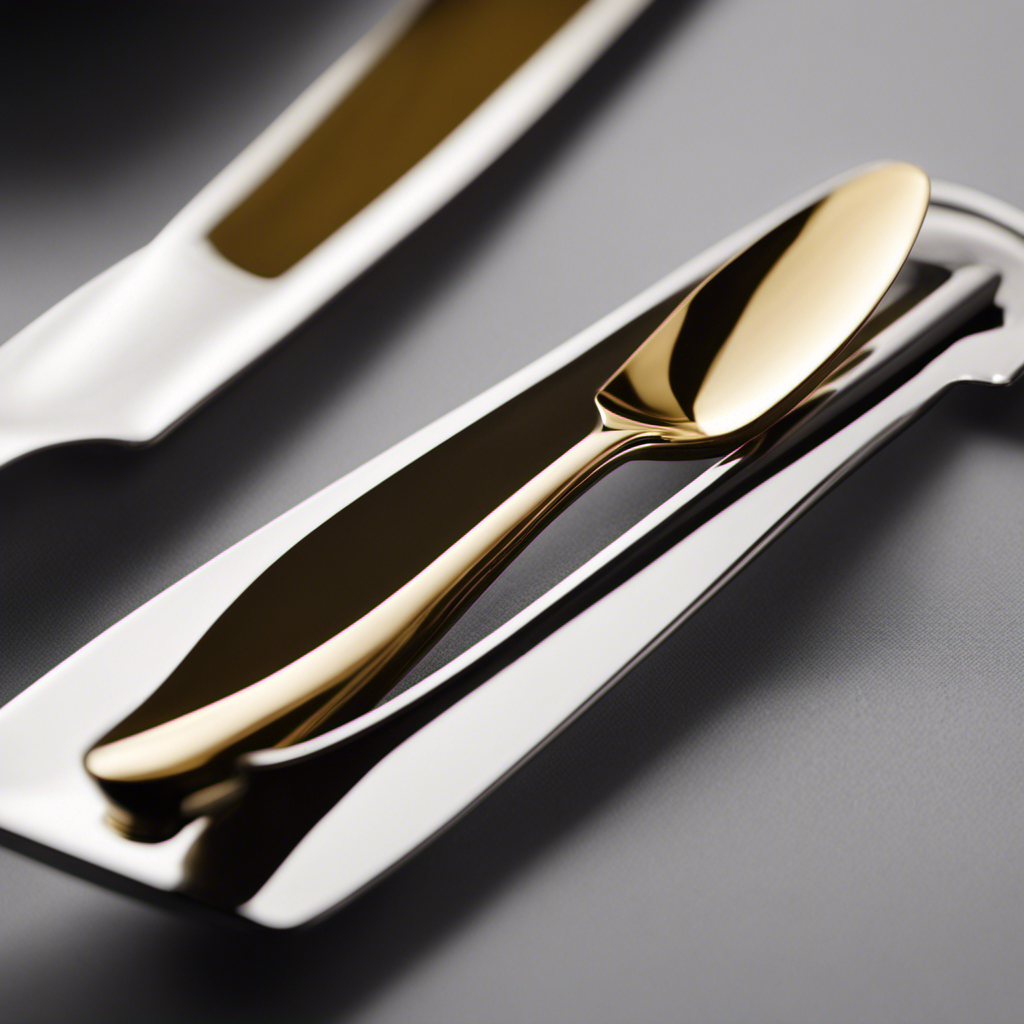As a health-conscious individual, I often struggle with the decision between indulging in butter’s tempting richness and savoring the Mediterranean allure of olive oil. Both have their advantages, but determining the healthier choice can be challenging.
In this article, we will delve into the nutritional comparison, impact on cholesterol levels, heart health benefits, cooking and baking considerations, as well as taste and flavor profiles of these kitchen essentials.
Prepare to have your taste buds tantalized and your health knowledge expanded. It’s time to settle the age-old debate: butter or olive oil?
Key Takeaways
- Olive oil is a better choice for high-heat cooking methods due to its higher smoke point.
- Olive oil lowers LDL cholesterol and increases HDL cholesterol, making it a healthier option for cholesterol management and cardiovascular health.
- Incorporating olive oil into the diet can have a positive impact on heart health by reducing the risk of heart disease.
- Butter adds richness and depth to baked goods, while olive oil brings out the natural sweetness of sautéed vegetables.
Nutritional Comparison
I think olive oil is healthier than butter because it contains more monounsaturated fats. When it comes to cooking methods, olive oil has a higher smoke point than butter, meaning it can withstand higher temperatures before breaking down and releasing harmful compounds. This makes it a better choice for high-heat cooking methods like frying or sautéing.
Additionally, olive oil has numerous health benefits. It’s rich in antioxidants, which help protect against inflammation and oxidative damage in the body. It has also been linked to a reduced risk of heart disease and certain types of cancer. Incorporating olive oil into your diet can be a simple way to improve your overall health.
Now, let’s explore the impact of olive oil and butter on cholesterol levels.
Impact on Cholesterol Levels
Using olive oil instead of butter can help lower cholesterol levels. Cholesterol management is crucial for maintaining good cardiovascular health. Research has shown that the type of fat we consume has a direct impact on our cholesterol levels, with saturated fats found in butter being known to raise LDL (bad) cholesterol. On the other hand, olive oil is rich in monounsaturated fats, which have been found to have a positive effect on cholesterol levels. In fact, studies have shown that incorporating olive oil into our diet can lead to a decrease in total cholesterol and LDL cholesterol, while increasing HDL (good) cholesterol. This is why many health professionals recommend using olive oil as a healthier alternative to butter for cholesterol management and overall cardiovascular health.
| Butter | Olive Oil |
|---|---|
| High in saturated fats | Rich in monounsaturated fats |
| Raises LDL cholesterol | Lowers LDL cholesterol |
| Increases cardiovascular risk | Decreases cardiovascular risk |
| Less heart-healthy option | More heart-healthy option |
Heart Health Benefits
Incorporating olive oil into my diet has been shown to improve heart health. Olive oil is known for its numerous heart health benefits. Compared to butter, olive oil is lower in saturated fat, which is known to increase cholesterol levels. Instead, olive oil is rich in monounsaturated fats, which have been shown to improve cholesterol levels and reduce the risk of heart disease.
Using olive oil in cooking and baking can be a healthier alternative to using butter. It has a mild taste and delicate flavor profile that pairs well with many dishes. Overall, incorporating olive oil into my diet can have a positive impact on my heart health, making it a smart choice for a healthier lifestyle.
Cooking and Baking Considerations
When cooking or baking, it’s important to consider the taste and flavor profile of the ingredients being used. Each ingredient brings its own unique qualities to a dish, and understanding how to use them properly can elevate your culinary creations. Here are some key considerations when it comes to cooking and baking:
-
Cooking Techniques: Different cooking techniques can affect the taste and texture of your dishes. For example, sautéing vegetables in olive oil can bring out their natural sweetness, while using butter can add richness and depth to baked goods.
-
Shelf Life: Knowing the shelf life of your ingredients is crucial for maintaining freshness and flavor. Butter has a shorter shelf life compared to olive oil, which can be stored for a longer period of time without spoiling.
-
Heat Tolerance: Butter has a lower smoke point compared to olive oil, making it more suitable for lower temperature cooking and baking. Olive oil, on the other hand, can withstand higher temperatures without burning.
-
Flavor Pairings: Understanding which ingredients pair well together can enhance the taste of your dishes. Butter complements flavors like garlic, herbs, and citrus, while olive oil enhances the taste of vegetables, salads, and grilled meats.
Taste and Flavor Profiles
I find that understanding the taste and flavor profiles of different ingredients enhances my culinary creations.
When it comes to culinary uses, each ingredient brings its own unique taste and flavor to a dish. For example, butter adds richness and a creamy texture to baked goods, while olive oil adds a fruity and slightly peppery flavor to salads and sautéed vegetables.
It’s important to consider the storage and shelf life of these ingredients as well. Butter should be stored in the refrigerator and has a shelf life of about one to three months, while olive oil should be stored in a cool, dark place and can last up to two years if properly stored.
Frequently Asked Questions
Can Butter or Olive Oil Be Used Interchangeably in Recipes?
When it comes to cooking, butter and olive oil can often be used interchangeably in recipes. However, it’s important to consider their differences.
Butter adds a rich flavor and is great for sautéing, while olive oil has a more subtle taste and is ideal for lighter dishes.
In terms of nutrition, olive oil is generally considered healthier due to its unsaturated fats and antioxidants.
Ultimately, the choice between butter and olive oil depends on personal preference and dietary needs.
Is It Better to Cook With Butter or Olive Oil?
When deciding between cooking with butter or olive oil, it’s important to consider the benefits of each.
Butter adds a rich, creamy flavor to dishes and can enhance the taste of certain foods.
On the other hand, olive oil is known for its health benefits, as it’s packed with heart-healthy monounsaturated fats and antioxidants.
Both have their advantages, so it ultimately depends on personal preference and dietary needs.
What Are the Differences in Texture Between Butter and Olive Oil?
When it comes to texture differences between butter and olive oil, the two are quite distinct. Butter has a creamy and solid texture, while olive oil is more liquid and smooth.
These differences impact cooking and baking in various ways. Butter can add richness and a flaky texture to baked goods, while olive oil lends a moist and tender texture.
As for their comparative nutritional benefits, olive oil is generally considered healthier due to its high content of monounsaturated fats.
How Do Butter and Olive Oil Affect Blood Sugar Levels?
When it comes to the effects on insulin response and comparison of glycemic index, it’s important to consider how butter and olive oil differ.
Butter is derived from animal fat and contains saturated fats, which can raise blood sugar levels.
On the other hand, olive oil is a monounsaturated fat that has a lower glycemic index and may have a more favorable impact on blood sugar levels.
Understanding these differences can help make informed choices about which option is healthier.
Can Butter or Olive Oil Be Used as a Substitute for Other Fats in Baking?
When it comes to baking, using butter or olive oil as a substitute for other fats can be a healthier choice. Both options offer their own unique health benefits.
Butter adds richness and flavor, while olive oil provides heart-healthy monounsaturated fats. However, it’s important to consider the specific recipe and desired outcome when choosing a substitute.
Ultimately, incorporating butter substitutes can be a smart way to reduce saturated fat intake and promote overall health.
Conclusion
In conclusion, when it comes to the debate between butter and olive oil, both have their merits.
However, for overall health and heart benefits, olive oil takes the lead. Its high levels of monounsaturated fats and antioxidants make it a healthier choice.
Additionally, olive oil’s versatility in cooking and its rich, fruity flavor make it a delicious and nutritious option.
So, next time you’re in the kitchen, consider swapping out the butter for olive oil and enjoy the benefits it brings to your health.









